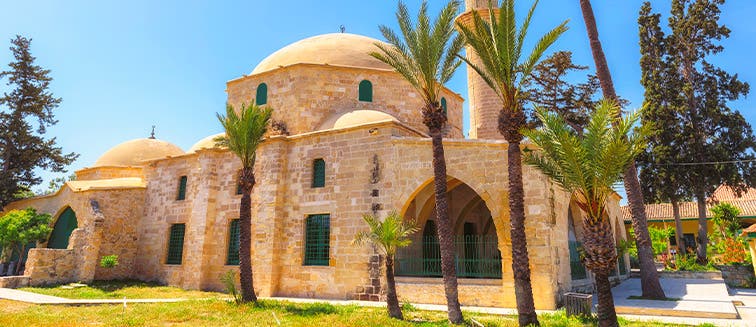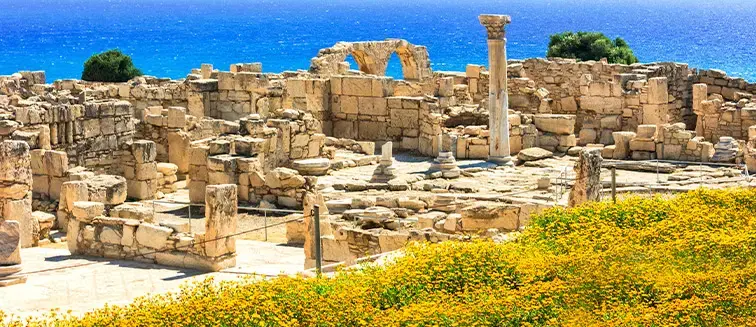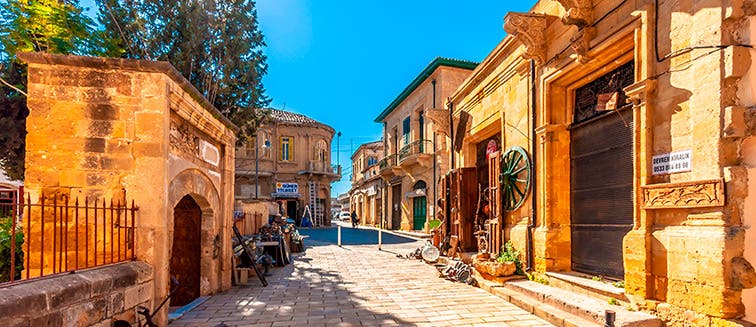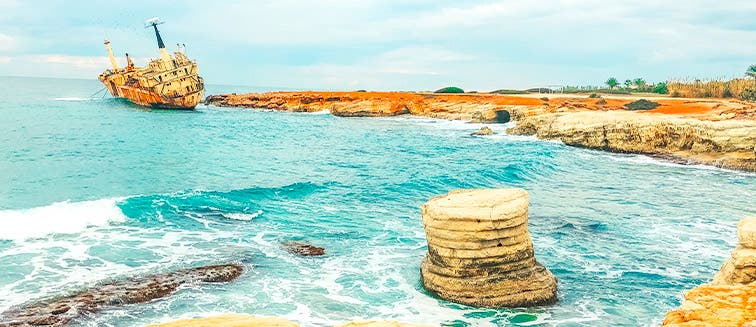Just south of Turkey in the eastern Mediterranean Sea lies the island of Cyprus, famed for its rich history, excellent gastronomy and beautiful, rugged landscapes. The Greek poet, Leonidas, described the island as a land of “wild weather and volcanoes”’, and if you travel to Cyprus today, you’ll still encounter the dramatic landscapes that inspired his words all those years ago. A meeting point of Asian and European influences, the island is separated in two, with a Turkish Cypriot northern region and the Greek Cypriot Republic of Cyprus in the south, representative of the two populations that inhabit the island.
If you love excellent Mediterranean cuisine, beautiful beaches and fascinating historical sights, you’ll savour a holiday in Cyprus. The capital city of Nicosia is an ideal starting point for tours of Cyprus, although the port city of Larnaca and the resort town of Paphos are among the most popular holiday destination on the island. Furthermore, honeymoons to Cyprus are eternally popular, since the island is said to be the home of Aphrodite, the Greek goddess of love.
History of Cyprus
A trip to Cyprus is the chance to encounter over 10,000 years of human history. Neolithic villages, such as Khirokitia, and the remains of some of the oldest wells on earth are among the ancient sites to explore on the island of Cyprus. Many great powers have left their mark on the highly-coveted island of Cyprus, including the ancient Greeks, Assyrians, Egyptians, Persians and Romans. After a period of Venetian rule, Cyprus came under the control of the Ottoman empire for over 300 years, between the 16th and 19th-centuries. To understand the civilizations that have shaped the island, be sure to visit the Greco-Roman ruins of Kourion, the Tombs of the Kings necropolis, the Sanctuary of Aphrodite and the Roman-era city of Salamis if you travel to Cyprus.
In more recent times, Cyprus was annexed by the UK in 1914, which soon led to clashes between the Greek and Turkish populations on the island. Many Greek Cypriots believes the British would transfer the island to Greece, and therefore welcomed the occupation, whilst Turkish Cypriots opposed this notion. Major political divisions ensued with violence, coups and military invasions taking place in Cyprus throughout the middle part of the 20th-century. In 1960, Cyprus gained independence from the UK, although in 1983 a separate Turkish Cypriot state was established in the north of the island. This de facto separation continues today, and the island is home to both the southern Republic of Cyprus and the northern Turkish Republic of Northern Cyprus. A narrow UN buffer zone exists between the two regions, although hostilities have been absent for a number of years now, with both sides dedicated to maintaining peace.
Nature in Cyprus
The third-largest island in the Mediterranean, Cyprus is bursting with unmissable natural sights. Furthermore, its idyllic climate ensures long, hot and dry summers, perfect for a beach holiday to Cyprus, alongside mild winters, ideal for getting out and exploring the rugging interior of the island. One of the most photographed natural sights on the island is Aphrodite’s Rock, said to have transported the Goddess of Love to the island in Greek mythology. For hiking trips, visitors can head to the lush scenery of the breathtaking Cedar Valley. The trees that grow here are closely related to the famous Lebanese Cedar. Alternatively, the dramatic landscapes of the Akamas Peninsula and its national park invite you to adventure off the beaten path. Here, you’ll find the Avakas Gorge, home to scenic nature trails and unique endemic plant species. Furthermore, Cyprus is also known for its waterfalls, with the cool waters of the Adonis Baths and the thundering cascades of Millomeri among the most popular places to take a dip during the hot summer months.
Of course, if you’re visiting Cyprus for sun, sea and sand, the island’s beaches are arguably among the best in Europe. Favourites include the white sand cove of Nissi Beach, the turquoise waters of Lara Bay and the little-known Blue Lagoon of Akamas, one of the best-kept secrets of the Akamas Peninsula! After all, package holidays to Cyprus are always popular and the island’s resort towns are loved by international tourists who come to enjoy the idyllic Mediterranean coastline. At the very heart of Cyprus stands Mount Olympus, 6401 feet high and a hot spot for hiking enthusiasts. In fact, it’s a popular skiing destination during the winter months!
Culture of Cyprus
When it comes to the culture of modern-day Cyprus, both Turkish and Greece influences are highly important. From the mouth-watering cuisine to the local languages, the fusion of both cultures is evident. Whilst both Greek Cypriots and Turkish Cypriots share many similarities in terms of culture, there are differences, most notably in terms of religion. Therefore, if you visit Cyprus you’ll find both mosques and Orthodox churches.
The official languages of Cyprus are Greek and Turkish, whilst Armenian and Cypriot Maronite Arabic are recognised minority languages. If you’re taking a holiday in Cyprus, you’ll be pleased to know that English is widely spoken across the country, and many road signs are also in English.
Cyprus boasts a long tradition of handmade crafts, most notably the creation of Lefkara lace, a practice that dates back to at least the 14th-century. Silversmithing and the making of intricate silver jewellery is another Cypriot tradition that continues today.
Of course, the island has been the stage for many great and powerful civilizations, and each has left its mark on the culture of Cyprus. If you travel outside the cities, you’ll find many well-preserved cultural treasures in the island’s rural villages and remote hill towns. One of the country's most important cultural festivals is the annual Limassol Carnival, said to have its roots back in an ancient Greek festival in honour of Dionysus, the god of winemaking, fertility and festivity!




